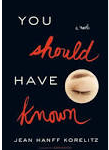 Grace Reinhart has it all. Her loving husband, Jonathan Sachs, is a pediatric oncologist dedicated to his patients. Her well-behaved 12-year old son, Henry, attends a competitive private school and studies violin with an aging middle-European exile with high standards. Grace and her family live in a charming Upper East Side apartment, and her therapy practice is thriving. Her relationship book, “You Should Have Known,” is about to be published and is generating enough interest that bookers from national talk shows have been calling.
Grace Reinhart has it all. Her loving husband, Jonathan Sachs, is a pediatric oncologist dedicated to his patients. Her well-behaved 12-year old son, Henry, attends a competitive private school and studies violin with an aging middle-European exile with high standards. Grace and her family live in a charming Upper East Side apartment, and her therapy practice is thriving. Her relationship book, “You Should Have Known,” is about to be published and is generating enough interest that bookers from national talk shows have been calling.
In the first third of the novel we learn all this, and a bit more. Grace misses her mom, who died when she was in college. Grace was very young when she married, only 21, and she hadn’t known Jonathan very long. She doesn’t have the best relationship with her father and his second wife, who is very formal. She is no longer in touch with her best friend from growing up and misses her. Jonathan grew up in a dysfunctional family and has no interest in regular contact with his parents and brother, and Grace barely notices that most of the rest of her friends have fallen away. Why should she? She has to take care of her husband and family and practice. So it’s no surprise, really, that Grace ignores a loose end here, a hole there, even as the signs that something is amiss accumulate. Then, over the course of one awful week, Grace’s comfortable life collapses. Psychologist: heal thyself.
Grace has utterly misjudged her husband who may, she learns, have committed a dreadful crime. She has misjudged her father, her friend, and, most of all, her capacity for judgment. The second and third parts of the novel follow Grace as she explores her faults and copes with the results, both large – she and Henry leave their New York apartment to escape the media circus – and well, large, as she resets most of the relationships in her life. (Fortunately for her most of the important people are loving and forgiving.) Grace does live in a state of grace, as almost everyone she has wronged is ready to forgive her, often just as she comes to the realization that, once again, everything she thought she knew was wrong. Perhaps as a result Grace remains confident even as she learns she is as fallible as her patients.
Jonathan remains offstage throughout the novel, an interesting authorial choice, as it means that we have to trust that Grace is becoming more and more reliable even as her creator slowly reveals how unreliable she has been since the start. It’s to Korelitz’s credit that she pulls this reversal off persuasively. Much of the novel recounts Grace’s inner life — this reader’s only complaint is that perhaps it’s recounted in too much detail – as Grace learns what she has missed in the 18 years of her marriage. She can’t get the time back, but she can make up for it, and that’s what she’s doing as the novel comes to an end.
Take “You Should Have Known” with you on vacation or save it for a long plane ride. And let us know what you think in the comments.
Have a book you want me to know about? Email me at asbowie@gmail.com. I also blog about metrics at asbowie.blogspot.com.


